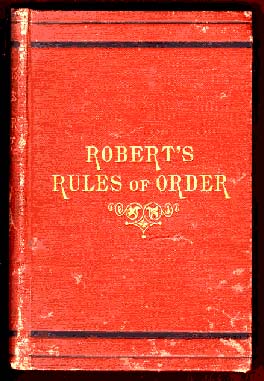Related Research Articles

Robert's Rules of Order, often simply referred to as Robert's Rules, is a manual of parliamentary procedure by U.S. Army officer Henry Martyn Robert. "The object of Rules of Order is to assist an assembly to accomplish the work for which it was designed ... Where there is no law ... there is the least of real liberty." The term "Robert's Rules of Order" is also used more generically to refer to any of the more recent editions, by various editors and authors, based on any of Robert's original editions, and the term is used more generically in the United States to refer to parliamentary procedure.
In parliamentary procedure, a point of order occurs when someone draws attention to a rules violation in a meeting of a deliberative assembly.
In parliamentary law, a mass meeting is a type of deliberative assembly or popular assembly, which in a publicized or selectively distributed notice known as the call of the meeting - has been announced:
In parliamentary procedure, an adjournment ends a meeting. It could be done using a motion to adjourn. A time for another meeting could be set using the motion to fix the time to which to adjourn.
An agenda is a list of meeting activities in the order in which they are to be taken up, beginning with the call to order and ending with adjournment. It usually includes one or more specific items of business to be acted upon. It may, but is not required to, include specific times for one or more activities. An agenda may also be called a docket, schedule, or calendar. It may also contain a listing of an order of business.
In parliamentary procedure, unanimous consent, also known as general consent, or in the case of the parliaments under the Westminster system, leave of the house, is a situation in which no member present objects to a proposal.
In US parliamentary procedure, the previous question is generally used as a motion to end debate on a pending proposal and bring it to an immediate vote. The meaning of this specialized motion has nothing to do with any question previously considered by the assembly.
In parliamentary procedure, reconsideration of a motion may be done on a matter previously decided. The motion to "reconsider" is used for this purpose. This motion originated in the United States and is generally not used in parliaments. A special form of this motion is reconsider and enter on the minutes.
In parliamentary procedure, an objection to the consideration of a question is a motion that is adopted to prevent an original main motion from coming before the assembly. This motion is different from an objection to a unanimous consent request.
In parliamentary procedure, the motion to postpone indefinitely is a subsidiary motion used to kill a main motion without taking a direct vote on it. This motion does not actually "postpone" it.
In parliamentary procedure, the motion to amend is used to modify another motion. An amendment could itself be amended. A related procedure is filling blanks in a motion.
In parliamentary procedure, a motion to appeal from the decision of the chair is used to challenge a ruling of the chair.
In parliamentary procedure, a motion is a formal proposal by a member of a deliberative assembly that the assembly take certain action. Such motions, and the form they take are specified by the deliberate assembly and/or a pre-agreed volume detailing parliamentary procedure, such as Robert's Rules of Order, Newly Revised; The Standard Code of Parliamentary Procedure; or Lord Critine's The ABC of Chairmanship. Motions are used in conducting business in almost all legislative bodies worldwide, and are used in meetings of many church vestries, corporate boards, and fraternal organizations.
In parliamentary procedure, a motion for division of a question is used to separate a motion into a set of motions.
Debate in parliamentary procedure refers to discussion on the merits of a pending question; that is, whether it should or should not be agreed to. It is also commonly referred to as "discussion".
In parliamentary procedure, requests and inquiries are motions used by members of a deliberative assembly to obtain information or to do or have something done that requires permission of the assembly. Except for a request to be excused from a duty, these requests and inquiries are not debatable nor amendable.
Parliamentary procedure is the body of rules, ethics, and customs governing meetings and other operations of clubs, organizations, legislative bodies, and other deliberative assemblies. General principles of parliamentary procedure include rule of the majority with respect for the minority.
In parliamentary procedure, the verb to table has the opposite meaning in the United States from that of the rest of the world:
A president is a leader of an organization, company, community, club, trade union, university or other group. The relationship between a president and a chief executive officer varies, depending on the structure of the specific organization. In a similar vein to a chief operating officer, the title of corporate president as a separate position is also loosely defined; the president is usually the legally recognized highest rank of corporate officer, ranking above the various vice presidents, but on its own generally considered subordinate, in practice, to the CEO. The powers of a president vary widely across organizations and such powers come from specific authorization in the bylaws like Robert's Rules of Order.
References
- ↑ Robert, Henry M.; et al. (2011). Robert's Rules of Order Newly Revised (11th ed.). Philadelphia, PA: Da Capo Press. p. 224. ISBN 978-0-306-82020-5.
- 1 2 3 4 5 6 Robert 2011 , p. 227
- 1 2 Robert 2011 , p. 226
- 1 2 Robert 2011 , p. 228